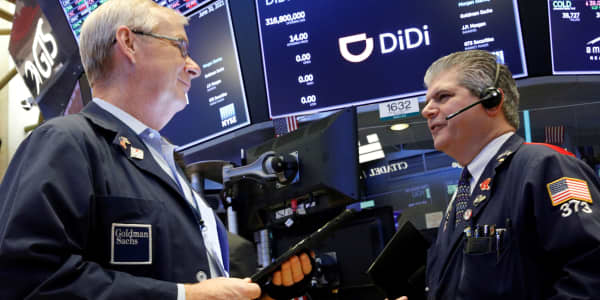To break into China and expand their businesses in Asia, companies need to establish a long-term strategy and a deep understanding of local practices, several business leaders told CNBC.
"If you want to come to Asia, and think that (you can just) turn around, bring back a bag full of money, don't make that mistake," said Hakon Bruaset Kjol, senior vice president, partner and external relations Asia, at mobile network operator Telenor. "We have seen so many companies come and try to do that. You need to be long term."
Speaking Wednesday at CNBC's East Tech West conference in the Nansha district of Guangzhou in China, Kjol said that the process of entering the Asian market will take longer for companies coming in with Western-developed principles and codes of conduct.
Beijing especially has tended to take a more reactionary approach to regulating fast-growing industries such as technology. As a result, Chinese start-ups have often pushed beyond the ethical boundaries of what a Western company might consider appropriate, before authorities step in.
"There aren't many Western tech companies that have had success in China because it is a very competitive environment," Mikkel Hippe Brun, co-founder of cloud-based supply chain company Tradeshift, said in a separate session at the conference on Wednesday. "Chinese companies run with Chinese speed and very short decision cycles. So Western companies (are) always behind, (and) seen as slow in those decision cycles."

After much trial and error, including reading "The Art of War," Hippe Brun said he found he needed to let the local team operate at "Chinese speed" while playing up the global nature of his company's platform to Chinese customers.
Three of the largest U.S. sports and entertainment groups are also taking a relatively slow, localized approach to China, regional heads said during a conference panel on Wednesday.
All three — the National Basketball Association, the National Football League and World Wrestling Entertainment — are working toward bringing a major game or show to the country. They are each already running a series of events to develop fan engagement and appreciation for their sport. But much of the successes and challenges have come from working with Chinese social media.
The National Basketball Association began working in China more than 30 years ago through a distribution deal with the state broadcaster CCTV, according to NBA China CEO Derek Chang. As local interest in mobile videos has grown, Chang said the games need to be shot specifically for the medium.
"It's actually a different broadcast than what you would get for the big screen," Chang said. "I think 70 percent of our viewership on Tencent is actually on a mobile device."

Last week, the NBA announced a deal with ByteDance to stream sports content on the company's highly popular Chinese apps Douyin and Toutiao, along with other platforms.
The National Football League's China strategy also accounts for different viewing habits than in the U.S. While American football fans often watch games live as a group, Chinese viewers tend to watch them on their own, according to Richard Young, managing director of NFL China. That's partly due to the roughly 12-hour time difference, which means Chinese are typically commuting during the live game broadcasts.
You really have to be very patient.Jay Ligeneral manager of greater China for World Wrestling Entertainment
As a result, Young said the NFL has put together five-episode highlight reels, which average 18 million views a week. He said the league has also created a show called "Gan Bu Tong" — a play on the Mandarin terms for American football and daring to be different — so Chinese fans can share why they enjoy the sport. In a country of more than 1 billion people, there are just over 900,000 viewers for a regular season game, Young said.
For World Wrestling Entertainment, or WWE, it took roughly nine years to understand the Chinese market enough to go "full force" on social media and a local digital first strategy, said Jay Li, general manager of greater China for WWE. "You really have to be very patient."
The franchise is implementing its direct-to-consumer subscription model in China for 30 yuan, or about $4.40, a month, Li said. However, he noted that WWE must rely on a local partner to stream.
Having a joint venture with a local partner has been the law for most Western companies operating in China. Beijing is now allowing some players in the auto and finance industry to have a majority or complete ownership of their local operation. But from a business perspective, many executives say foreign companies still need staff or partners with deep local know-how in order to succeed.
As Chinese and Asian companies catch up with and even surpass their Western peers, foreign companies can also take advantage of developments in local innovation.
"We don't operate in India anymore, but the learnings that we brought with us (from the) telco, IT sector, has changed the operating model in many of our operations," Telenor's Kjol said. "Don't only look at the big names. Look at the local talent base and try to tap into that."





